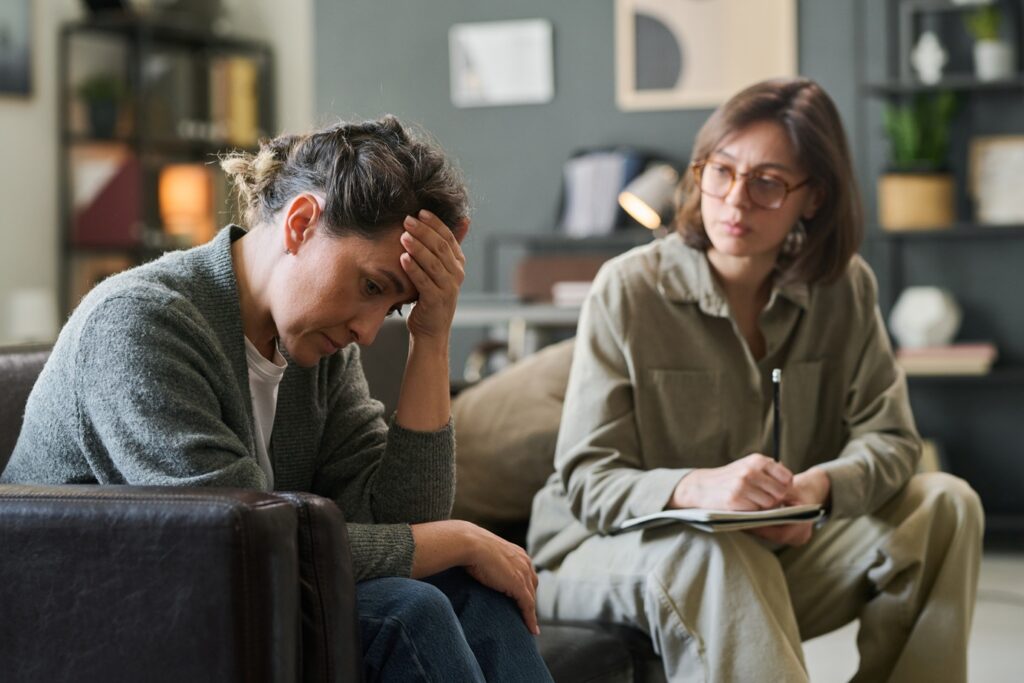Just weeks out from the federal election, the Albanese government has announced a $1 billion funding pledge that would make it easier for people, particularly young Australians, to access mental health care for free.
The funding pledge is aimed at addressing the “missing middle” as the Minister for Health Mark Butler describes it, meaning patients that “can’t quite be cared for sufficiently in primary care, but not so unwell that [they] end up having to be in hospital”.
One of Australia’s leading mental health services Beyond Blue says women are more likely than men to experience depression and anxiety in their lifetime. In Australia, 3.4 million women have experienced an anxiety disorder, and 1.9 million women have experienced an affective disorder, such as a depressive episode, dysthymia and bipolar affective disorder.
Despite this, research from the Liptember Foundations shows only 48 per cent of women reached out for support last year when they were experiencing mental ill-health.
Minister Butler acknowledges that Australia has had “too much of a one-size fits all approach to mental health where we try and cram everyone’s needs into one system of support and generally require people to get a bit unwell before they access them.”
In an effort to change this, Labor’s new $1 billion funding proposal will go towards opening 20 youth specialist care centres and a National Institute for Youth Mental Health, expanding the headspace network, opening new and upgraded Medicare Mental Health Centres and growing the mental health professional workforce.
It comes after Opposition leader Peter Dutton last month announced the Coalition would spend $400 million on youth mental health services. The Coalition has also pledged to reinstate 20 Medicare-funded psychology sessions (rather than the current 10), if it is elected.
Here’s a closer look at where the proposed funding will go if Labor is re-elected.
Youth Specialist Care Centres and a National Institute for Youth Mental Health
The Youth Specialist Care Centres will provide free specialist support for complex mental conditions including psychosis, eating disorders, moderate to severe mood and anxiety disorders, substance use disorders, personality disorders and neurodevelopment concerns.
“These are free. They don’t require a referral. They’re available to walk in. You don’t need to make an appointment, and you connect very quickly with trained mental health workers who are able to examine your level of mental distress and provide you with support, and if needed, connect you with other levels of support that you might need,” says Minister Butler.
Along with these centres, the National Institute for Youth Mental Health will aim to link research with clinical practice and family and carer participation in the youth mental health system – particularly in areas like eating disorders, early intervention and links between social media and mental health.
Expanding the headspace network
Headspace centres provide vital, free mental health support to thousands of young people (12-25) every year.
This latest investment will open 8 new and upgraded headspace centres, including two in remote Australia. It will also create an additional 20 headspace outreach locations in rural areas across Australia, as well as upgrade existing headspace locations into headspace Plus centres that will be equipped to respond to more complex and serious mental health needs.
Upgrading Medicare Mental Health Centres
Labor’s investment will open 31 new and upgraded Medicare Mental Health Centres, where anyone in the community can walk in and receive free mental health care without a referral or appointment.
They’re staffed by mental health professionals and every centre has access to psychiatrists, psychologists and GPs. The government is already establishing 61 Medicare Mental Health Centres and this investment will take that number up to 92.
Growing the mental health professional workforce
Aiming to address the mental health workforce shortage, Labor’s investment will create and an extra 500 postgrad psychology student places. This will bring the total number of postgraduate psychology student places created under the Albanese Government to 1,000.
The government is also supporting 200 GPs and medical professionals to undertake the newly established Certificate of Postgraduate Training in Clinical Psychiatry through a $10,000 subsidy and extending funding for an additional 30 psychiatry training places.
In addition, there will be a creation of 500 training placements for peer mental health workers and providing $5,000 per student to not-for-profit organisations to facilitate placements and support supervision costs in public mental health services.
Support Women’s Agenda! We are 100% independent and women-owned. We’re covering the Federal Election from the perspective of what matters to women, and always keeping the issues that matter for women on the daily agenda. Foundation memberships are just $5 a month.
Bonus: you’ll receive our weekly editor’s wrap of the key stories to know every Saturday.


